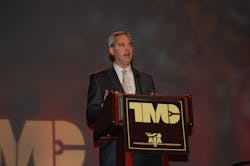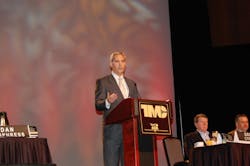NASHVILLE. Permanently repealing certain provisions of the 34-hour restart rule within current hours of service (HOS) regulations – provisions suspended by Congressional action late last year – remains a top priority of the American Trucking Assns. (ATA) for this year, according to David Osiecki, the trade group’s executive VP and chief of national advocacy.
Stepping in on short notice as the keynote speaker for the 2015 Technology & Maintenance Council (TMC) annual meeting, Osiecki highlighted a wide range issues ATA plans to focus on in the coming months.
“It took significant lift to even get a one-year suspension of those [HOS] restart provisions, so trying to get a permanent fix will be very difficult,” he said.Osiecki (seen at right) also noted that “the driver shortage is as bad as it’s ever been” and is a situation the industry “needs to place greater emphasis upon” going forward.
To that end, ATA wants to put renewed focus upon lowering the allowable age for obtaining a commercial driver’s license (CDL) to around 18 or 19 years of age in order to attract high school graduates to the truck driving career.
“We believe lowering the age and offering a conditional CDL with oversight and monitoring will allow the industry to better address the driver shortage,” Osiecki noted. “Now, not every 18 or 19 year old is suited to drive a truck; we get that. But we think this can be done in a responsible way.”
Other issues ATA plans to focus on in 2015 include:
- Inserting “anti-toll” language into the next highway bill. “This industry does not like tolls,” Osiecki noted.
- Raising fuel taxes to help fund a national freight policy. “You need money in your checking before you can write checks; that’s why we need to direct more fuel tax money into the highway trust fund (HTF) before we can fund infrastructure projects,” he said.
- Establishing a “standard speed” for speed limiters. “The industry is already using speed-limiting technology, but some are governing their trucks at 62 mph while others govern them at 71 mph,” he pointed out. “We’d like to see a single standard speed set.”
Osiecki closed with an interesting observation about the pace of regulatory action in the U.S.: namely that rulemaking activity should significantly increase this year before screeching to a halt in 2016.
“I will tell you based on my observations that there is a pattern to presidential administrations; and both parties do this” he explained.
“In the third year [of a four-year presidential term] the administration does as many rulemakings as they can,” Osiecki said. “But by year four, that regulatory pipeline slows to a halt. So I expect we’ll see the next ‘halt’ occur in 2016.”
About the Author
Sean Kilcarr
Editor in Chief
Sean Kilcarr is a former longtime FleetOwner senior editor who wrote for the publication from 2000 to 2018. He served as editor-in-chief from 2017 to 2018.

